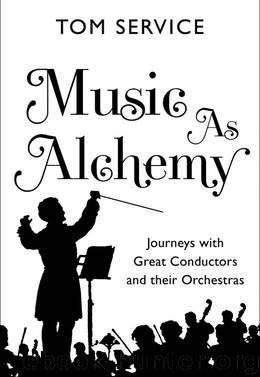Music as Alchemy by Tom Service

Author:Tom Service [Tom Service]
Language: eng
Format: epub
ISBN: 9780571268719
Publisher: Faber & Faber
Published: 2012-03-16T04:00:00+00:00
It’s not just thanks to perceived national characteristics that Sibelius doesn’t have a bigger place in the hearts, minds, and repertoires of the Berlin Philharmonic, or any other German or Austrian orchestra. As Rattle says to me during the days of rehearsals leading up to the three concerts of the last three symphonies, ‘Adorno has a lot to answer for.’ Rattle means the German philosopher and sometime composer Theodor W. Adorno, who was part of the Frankfurt School, and whose writing on sociology, culture, and music has been extraordinarily influential, particularly in German-speaking countries since his death in 1969. To give a thumbnail caricature of Adorno’s philosophical position when it came to twentieth-century music: the progressive atonality of Schoenberg was the epoch’s best answer to the question of finding a music that was new, in terms of the language it created; it was critical, in the sense of resisting the worst aspects of what Adorno called the ‘culture industry’; and historically mediated, in the sense that Schoenberg’s compositional discoveries were both a rejection of the exhausted models of tonality that had preceded him in the works of Wagner or Mahler, and their apotheosis. Schoenberg’s oppositional pole, in Adorno’s terms, was Stravinsky, whose re-imaginings of the past and use of pre-existing musics, whether folk tunes or jazz rhythms, were empty, decadent, and doomed only to regurgitate the worst aspects of the contemporary world back to a grateful audience, instead of progressing the future of music, and therefore, of society. (Schoenberg himself, however, had no time for Adorno, complaining of his ‘pomposity’ and ‘oily pathos’, despite the philosophic-aesthetic victory Adorno ‘won’ on his behalf.)
But if Stravinsky gets it in the neck from Theodor Adorno, that’s nothing compared to what he thought of poor old Sibelius. The great Finn’s music was worthy only of Adorno’s utter contempt. This sort of thing, from 1966, the year after Karajan’s trip to Helsinki, is typical:
I would like at least to suggest why attempts to go on speaking the traditional language of music are stricken with impotence. I refer you to Jean Sibelius. He wanted something of this kind. Nowhere did he go beyond the limits of the existing, traditional tonal means. In spite of which – this much must be conceded – he found something like an individual style.
Download
This site does not store any files on its server. We only index and link to content provided by other sites. Please contact the content providers to delete copyright contents if any and email us, we'll remove relevant links or contents immediately.
The Goal (Off-Campus #4) by Elle Kennedy(13645)
Kathy Andrews Collection by Kathy Andrews(11801)
Diary of a Player by Brad Paisley(7542)
What Does This Button Do? by Bruce Dickinson(6193)
Assassin’s Fate by Robin Hobb(6192)
Big Little Lies by Liane Moriarty(5781)
Altered Sensations by David Pantalony(5091)
Pale Blue Dot by Carl Sagan(4992)
Sticky Fingers by Joe Hagan(4181)
The Death of the Heart by Elizabeth Bowen(3599)
The Heroin Diaries by Nikki Sixx(3538)
Beneath These Shadows by Meghan March(3297)
Confessions of a Video Vixen by Karrine Steffans(3292)
How Music Works by David Byrne(3252)
The Help by Kathryn Stockett(3134)
Jam by Jam (epub)(3071)
Harry Potter 4 - Harry Potter and The Goblet of Fire by J.K.Rowling(3052)
Computational Linguistics and Intelligent Text Processing: 20th International Conference, CICLing 2019 La Rochelle, France, April 7â13, 2019 Revised Selected Papers, Part I by Alexander Gelbukh(2976)
Strange Fascination: David Bowie: The Definitive Story by David Buckley(2850)
